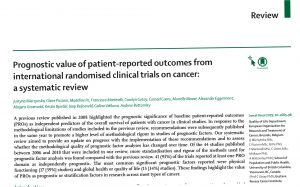Quality of life assessment is becoming increasingly important in oncology: a paper published in The Lancet Oncology by Andrew Bottomley of the European Organisation for Research and Treatment of Cancer (EORTC) in Brussels, Belgium, and colleagues from seven countries presents the findings of a meta-analysis of 44 clinical trials conducted between 2006 and 2018 on patients with cancer that report quality of life scores: “We saw that, each year, the scientific literature was populated with dozens of new analyses showing the value of QoL scores, but these were single analyses and many of the trials had limited methods,” says Dr Bottomley. “We decided to try to follow up an earlier EORTC analysis that showed QoL was important, but that methods and standards of its analysis needed improvement”.
 The trials that tried to evaluate the prognostic significance of baseline patient-reported outcomes (PROs) as independent predictors of the overall survival of patients with cancer, comprehend 28281 patients across 13 different cancer types. The sample included nine studies on lung cancer, six on head and neck cancer, five on pancreatic cancer, five on ovarian cancer, three on colorectal cancer, three on prostate cancer, three on esophageal cancer three on brain cancer, two on liver cancer, two on breast cancer, one on gastric cancer, one on myeloma, and one on melanoma. Most studies (89%) included patients with advanced or metastatic stages of disease, and in total 23122 patients completed PRO assessments. The main PRO tools used were the EORTC Quality of Life Core questionnaire and the Functional Assessment of Cancer Treatment questionnaire: these were combined with clinical factor assessments such as performance status, tumor size, and serum markers.
The trials that tried to evaluate the prognostic significance of baseline patient-reported outcomes (PROs) as independent predictors of the overall survival of patients with cancer, comprehend 28281 patients across 13 different cancer types. The sample included nine studies on lung cancer, six on head and neck cancer, five on pancreatic cancer, five on ovarian cancer, three on colorectal cancer, three on prostate cancer, three on esophageal cancer three on brain cancer, two on liver cancer, two on breast cancer, one on gastric cancer, one on myeloma, and one on melanoma. Most studies (89%) included patients with advanced or metastatic stages of disease, and in total 23122 patients completed PRO assessments. The main PRO tools used were the EORTC Quality of Life Core questionnaire and the Functional Assessment of Cancer Treatment questionnaire: these were combined with clinical factor assessments such as performance status, tumor size, and serum markers.
A prognostic prediction tells patients how much time they can expect to survive; in the 93% of the studies (41 out of 44) the researchers found that at least one PRO domain (i.e. physical functioning or pain) was significantly associated with overall survival after other clinical variables had been controlled for. The most commonly reported independent prognostic factors were physical functioning (17 of 44 RCTs) in nine types of cancer, and baseline GHQ (Global Health status or quality of life) scores (15 RCTs) in eight types of cancer.
The most frequently reported prognostic symptom associated with overall survival was pai. Most studies reporting physical functioning (n=17) or GHQ scores (n=15) as prognostic factors involved patients with advanced or metastatic stages of disease (physical functioning, 16 of 17 RCTs; GHQ scores, 14 of 15 RCTs).
The results of this meta-analysis should embolden clinicians to take more interest in patients’ QoL scores and to understand their importance, as they reflect patients’ needs and concerns. “We plan to do a further analysis in five years’ time to check that future studies have improved methods further, whether clinical triallists are using these results to stratify patients in trials, and the extent to which they are being used as prognostic indicators,” Bottomley says.





